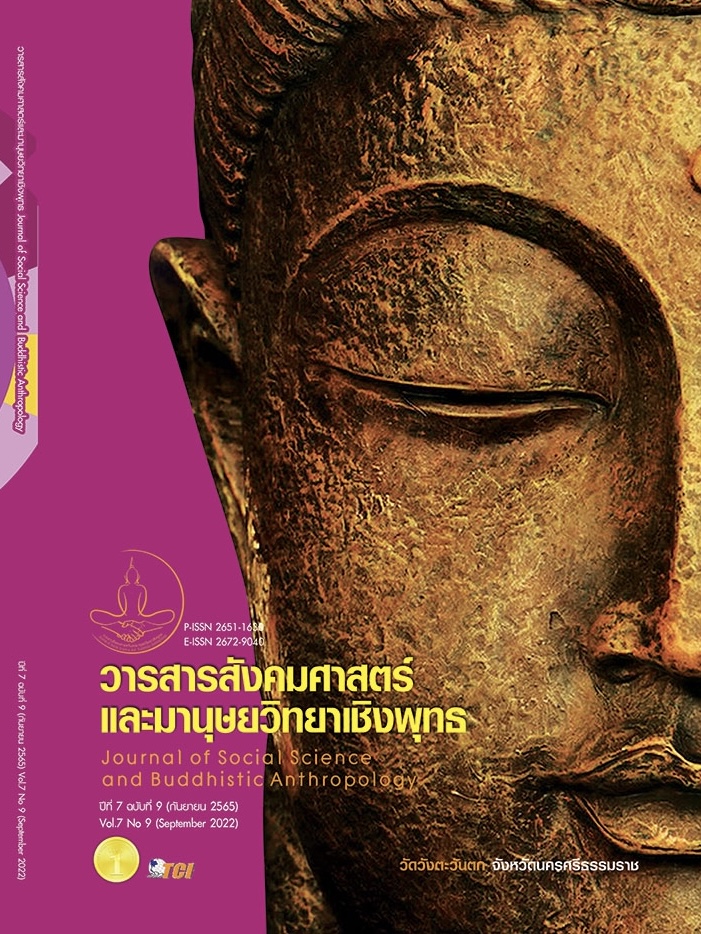INTEGRATED MANAGEMENT FOR WELL-BEING DEVELOPMENT OF WONG WEAN YAI COMMUNITIES IN ACCORDANCE WITH THAILAND 4.0 POLICY FRAMEWORK
Keywords:
Integrated Management, Well-Being Communities, Wong Wean Yai, Thailand 4.0 PolicyAbstract
The objectives of this research article were to 1) study the consistencies between the current state of public management in the Wong Wien Yai communities and the implementation of the Thailand 4.0 Policy framework, 2) analyze the strengths, weaknesses, opportunities, and obstacles of the Wong Wien Yai communities in public management regarding to Thailand 4.0 Policy framework, 3) find an integrated management approach for Wong Wien Yai well-being communities development policy in accordance with the Thailand 4.0 policy framework, and 4) propose applicable integrated management well-being development policies for Wong Wien Yai communities in accordance with Thailand 4.0 Policy framework. This research is the qualitative research. The informants in this study consisted of 3 essential groups; 1) Government executives and officers who are involved in formulating and implementing policies, 2) Wong Wean Yai community leaders and 3) Entrepreneurs and business owners in the Wong Wean Yai Communities. The results of this research indicate that the integrated management for well-being development of Wong Wean Yai communities in accordance with Thailand 4.0 Policy framework is as follows: 1) Traditions, cultures, and environment development should have a unique characteristics and features based on existing traditions, cultures, and environment. 2) Promote the community strength form within via the community knowledge management process that dedicated to the knowledge capture form expert and skilled people in various matters within the communities. The well-being community development diversity can create self-awareness and understanding of distinctive lifestyles and cultures. 3) The public policy management should be fair strategically distributed to overall communities with positive attitude and well-educated mind on local community knowledge based through local government, private, and community organizations. 4) Provide the development of the people skills in the communities that meets the challenges of disruptive technology in all dimensions. 5) All organizations such as government, private, and community organization should effectively and strategically integrate focusing on sustainable well-being community results that clearly benefits to local communities in the area.
References
ณฐาภพ ยมนิจดา. (2553). การบริหารการพัฒนาเมืองน่าอยู่ : กรณีศึกษา เทศบาลตำบลในพื้นที่บริเวณชายแดนไทย-กัมพูชา. วารสารวิชาการมหาวิทยาลัยปทุมธานี, 57(2) 57-67.
บุญทัน ดอกไธสง. (2520). จิตวิทยาผู้นำและมนุษย์สัมพันธ์. กรุงเทพมหานคร: เทพนิมิตการพิมพ์.
เบญจพร วงษ์วานิช. (2550). การมีส่วนร่วมของประชาชนในการพัฒนาไปสู่เมืองน่าอยู่: กรณีศึกษาเทศบาลเมืองฉะเชิงเทรา อำเภอเมือง จังหวัดฉะเชิงเทรา. ใน วิทยานิพนธิ์รัฐประศาสนศาสตรมหาบัณฑิต สาขาวิชานโยบายสาธารณะ. มหาวิทยาลัยบูรพา.
มัญชุชาดา เดชาคนีวงศ์. (2565). แผนพัฒนากรุงเทพมหานคร ระยะ 20 ปี (พ.ศ. 2556-2575). กรุงเทพมหานคร: สำนักยุทธศาสตร์และประเมินผล
สำนักงานคณะกรรมการพัฒนาเศรษฐกิจและสังคมแห่งชาติ. (2550). แผนพัฒนาเศรษฐกิจและสังคมแห่งชาติ ฉบับที 4 10 (พ.ศ. 2550 - 2554). กรุงเทพมหานคร: สำนักนายกรัฐมนตรี.
สำนักงานเศรษฐกิจอุตสาหกรรม. (2560). โครงการบริหารการขับคลื่อนอุตสาหกรรมที่มีศักยภาพของประเทศ. กรุงเทพมหานคร: สำนักงานเศรษฐกิจอุตสาหกรรม.
สุวิทย์ เมษอินทรี. (2559). ไขรหัส “ประเทศไทย 4.0”สร้างเศรษฐกิจใหม่ก้าวข้ามกับดักรายได้ ปานกลาง. เรียกใช้เมื่อ 2 มกราคม 2565 จาก http://www.thairath.co.th/ content/613903
อริสา จันทรบุญทา และจิรัฐ เจนพึ่งพร. (2561). FOCUSED AND QUICK (FAQ) Issue 128 ความเป็นเมือง (Urbanization) และนัยเชิงนโยบายของไทย. กรุงเทพมหานคร: สายนโยบายการเงิน ธนาคารแห่งประเทศไทย.
Alan, G. & Josef, G. (1981). Cities, Poverty, and Development: Urbanization in the Third World. New York: Oxford University Press.
Davidson, J. L. (1995). The Relationship between Questions and publics Responses During a Directed Reading Activity. Dissertation Abstracts International, 12: 6273-A.
Klaus Schwab. (2018). The Fourth Industrial Revolution.World Economic Forum. Cologny: Switzerland.
Downloads
Published
How to Cite
Issue
Section
License
Copyright (c) 2022 Journal of Social Science and Buddhistic Anthropology

This work is licensed under a Creative Commons Attribution-NonCommercial-NoDerivatives 4.0 International License.









